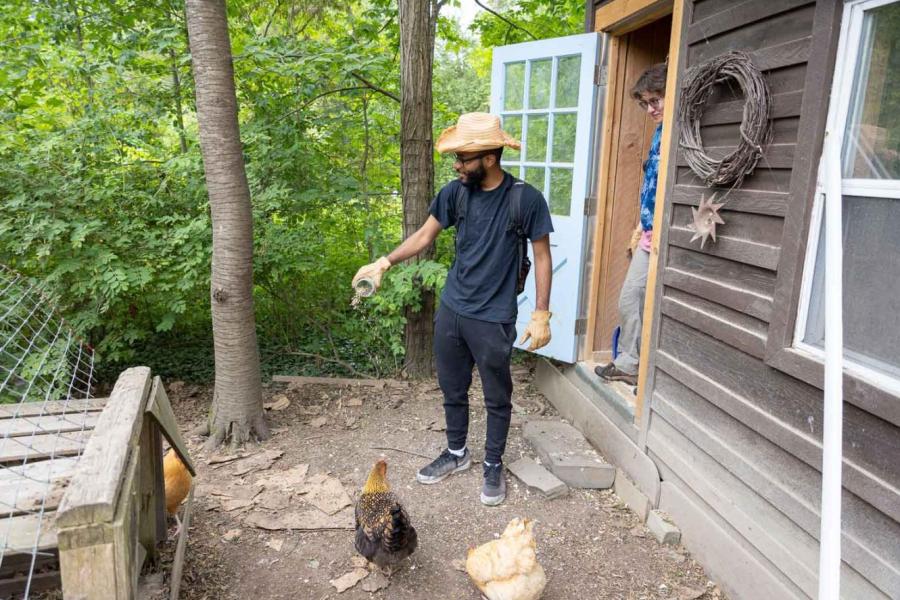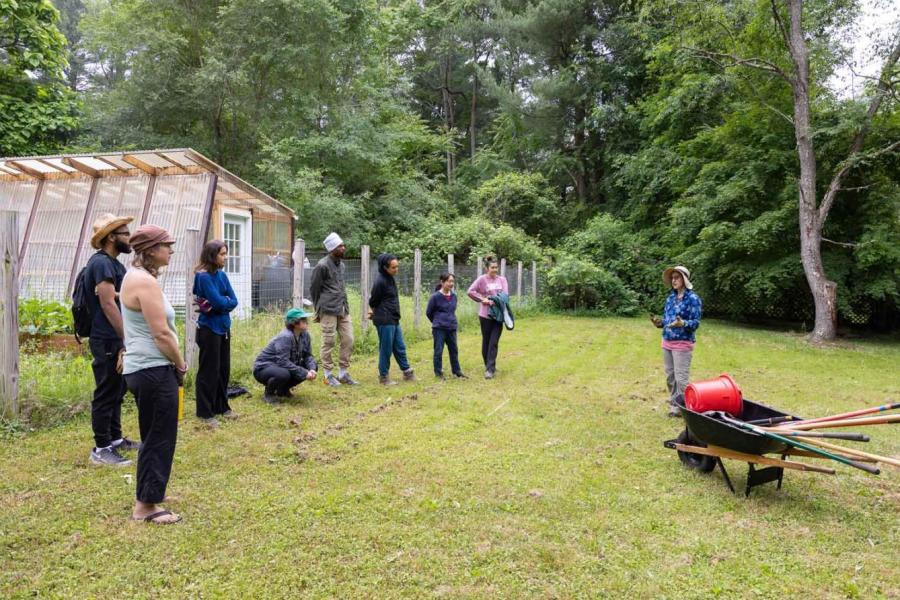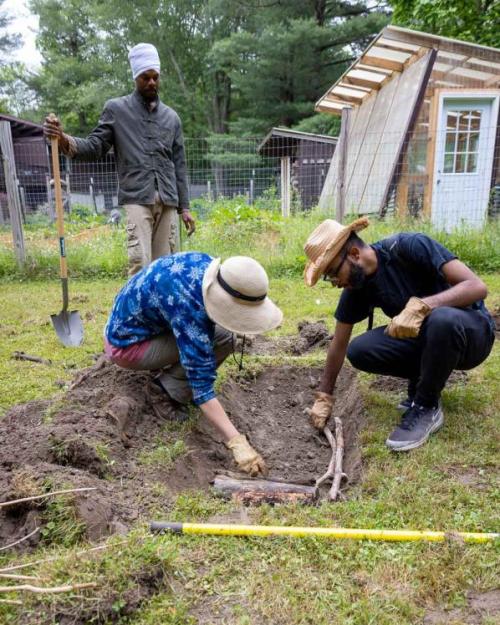Nexus Scholars study connections between wellness & environment
This summer, Audrey Lockett ’24 is learning about the importance of respecting all sorts of labor – from academic research and reading to physical tasks such as turning weedy beds into productive gardens or cleaning toilets. As a human biology health and society major, she’s also learning how connecting to the environment and spirituality can benefit overall wellness.
McKenna Norton ’25 is becoming a pro on hügelkultur, a centuries-old way of building a garden bed from rotten logs and plant debris. She’s also acquiring public speaking and teaching skills and exploring her interests in religion and philosophy.
Norton and Lockett are two of the five students working this summer with Professor Jane-Marie Law at Law’s Fallen Tree Sustainability Center in Ithaca. Norton and fellow student Joaquin Smith ’24 received funding from the Nexus Scholars Program for their summer work. Law is an associate professor of religious studies and Asian studies.
“I’m interested in studying how religion affects sustainability and sustainable behaviors,” Norton said. The students have been working at four sites this summer – the Fallen Tree Center, Kendal at Ithaca, a farm outside Ithaca and a downtown Ithaca yard owned by Yumi Asakura. “Yumi’s garden is a good example of how someone in an urban environment can transform their yard into something sustainable,” Norton said.
Each week, students learn another practical skill related to sustainability and then teach those skills to a group of 20 community members at the various sites. Since Fallen Tree operates in the Zen tradition, their days begin with 30 minutes of meditation – “It’s a way to start the day and quiet your mind,” Law said.
Law opened the sustainability center in 2015, when the house next door to hers came up for sale. She improved the property, adding a bridge between the two houses, various gardens, a chicken coop and compostable beds and plenty of space to highlight sustainable practices including fences made of fallen branches, rain barrels and pollinator gardens.
“This place is all about teaching people the principles of sustainable living,” she said. “Everybody that I know wants to live a more sustainable lifestyle and get back to the land, but they buy 10 acres in the countryside and they don’t know what they’re doing and they fail. The reality is that you can farm the suburbs. It’s very manageable.”
Along with practical skills, students working with Law also learn about ethical leadership and study how learning about sustainable practices impacts people’s environmental behaviors and their relationship to others in their neighborhood.
Smith, who is an astronomy major studying Japanese, is a natural in front of the class of community members. On a recent Tuesday, he shared information on the daily routine of cleaning tools. Law often finds tools at secondhand stores – or even on the side of the road – and repairs and restores them. She also offers classes on tool repair.
Classes at Fallen Tree, which are always free for community members, are supported by donations. Food from the gardens and berry patches is donated to local pantries. Fallen Tree is a member of the Center for Transformative Action at Cornell.
The summer curriculum includes classes on topics such as:
- Mapping your space and using your imagination as a powerful tool
- Understanding embodied energy and caring for tools
- Composting in several different styles and methods
- Container gardening
- Hügelkultur
- Mushroom inoculation and cultivation
- Pollinator support gardening and introduction to beekeeping
- Getting a backyard flock of chickens
- Fermentation of basic foods for flavor and health
- Basic bread baking
- Finding plastics alternatives in your life
- Weaning yourself off fast fashion and living better
- Small scale water retention and management
- The importance of sharing and how to do it with your bounty
After three full Saturdays of work, Asakura’s backyard now includes several of these features.
“I was lost in my garden, trying to make it nice, but I just never got it done,” she said. “The team was amazing, and I saw the power of collective efforts.”
Lang Miller travels on Tuesdays from Bath, N.Y. to participate in the classes at Fallen Tree.
“I grew up in seeing my grandmother in her backyard with asparagus, melons, tomatoes, peach trees, plum trees and pears,” Miller said. “We didn’t have to get a lot of produce from the stores. Now, I’m learning how to do these things too and keep those traditions going.”






